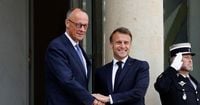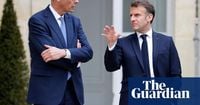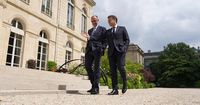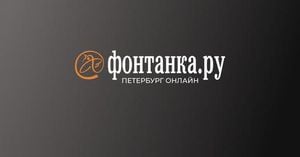PARIS – Newly elected German Chancellor Friedrich Merz and French President Emmanuel Macron pledged on Wednesday, May 7, 2025, to "make Europe more sovereign" by developing the continent’s defense and boosting its competitiveness. Merz sought comfort from Macron on Wednesday morning in an effort to initiate a "reset" in relations between Paris and Berlin.
The French president’s advisers had eagerly awaited Merz's coronation, following what they saw as the lackluster tenure of Olaf Scholz. Merz's brief visit to Paris was a stopover on his way to Poland, Germany's other key security partner on the continent. "I want to commend Germany’s decision to invest heavily in defense," said Macron, a major advocate for Europe's ongoing defense push, which the two leaders pledged to drive forward.
During their first formal meeting, Merz expressed his desire to discuss nuclear deterrence in Europe with France and the United Kingdom, "as a complement to what we already have with our American partners." They also emphasized their commitment to Ukraine, stating, "We remain united and firmly committed to a sovereign and independent Ukraine." This sentiment was echoed in a joint op-ed published just before their press conference, where they stressed they would not accept "a peace that would be imposed." Nonetheless, Merz highlighted the importance of the U.S. providing security guarantees upon the conclusion of any peace agreement.
Macron announced the launch of a joint "Defense and Security Council" in the summer of 2025, stating that Paris and Berlin intended to "respond together to the challenges Europe faces" and "act hand in hand." The two leaders also discussed the implementation of the EU's competitiveness agenda, emphasizing a "realignment" of their energy policies and reducing the administrative burden within the EU.
Merz plunged straight into international crises on his first full day as chancellor, urging India and Pakistan to de-escalate their tensions, vowing support for Ukraine, and announcing plans to travel to Kyiv soon. In a joint news conference, he acknowledged that Europe still needed the U.S. for peace in Ukraine, while both leaders vowed to strengthen the continent’s security and increase defense spending.
“It is our firm conviction that we cannot end this war in Ukraine without further political and military engagement by the United States of America,” Merz said, emphasizing that "the Europeans cannot replace this at present." Macron labeled Russia a "systemic threat" to European security and stated that France and Germany would "accelerate" defense cooperation, including working together on tanks, long-range missiles, and combat aircraft.
Both leaders also teamed up to demand that Israel allow humanitarian aid for civilians in Gaza, which has been embroiled in a devastating war for nearly 20 months. The conflict began on October 7, 2023, when Hamas militants attacked southern Israel, resulting in significant casualties and hostages. Israel’s ongoing offensive has reportedly claimed over 52,000 lives in Gaza, many of whom are women and children.
Merz's comments regarding Israel were notable given Germany's historical support for the nation, as he called for Israel to be "more responsible" in its military actions. Macron echoed this sentiment, stating that France could not defend Ukrainians’ sovereign rights while ignoring the plight of Palestinians in Gaza, asserting, "We cannot have double standards."
Amid these discussions, Merz and Macron expressed their concerns over escalating tensions between India and Pakistan, particularly after India fired missiles into Pakistani-controlled territory early on Wednesday, resulting in at least 26 fatalities, including a child. The leaders viewed the clashes between these two nuclear powers with the utmost concern.
Merz's trip to Paris came just a day after his historic defeat in the first round of voting in the German parliament, an unprecedented occurrence for a post-war candidate for German chancellor. He ultimately secured victory in the second round. Traditionally, newly elected chancellors visit their neighboring countries to emphasize European unity, and Merz's stop in Paris demonstrated his intent to engage actively in world affairs.
Macron described their meeting as "a new page" in the French-German partnership, emphasizing the need for a collaborative approach to address the challenges posed by Trump’s policies and Russian aggression. The French president also expressed hope that the two countries could work together to ensure a united European response to the pressures exerted by the U.S. and Russia.
As Merz prepares to travel to Poland later on Wednesday, the significance of his meetings in Paris and Warsaw is underscored by the 80th anniversary of Nazi Germany’s unconditional surrender in World War II. Observers note that this historical context adds weight to the discussions around Franco-German relations and the future of European unity.
The reset in Franco-German relations is seen as vital for overcoming the "enormous" security and economic challenges facing Europe. Analysts suggest that Merz and Macron, both more European-minded and dynamic personalities, may prove to be a more effective leadership duo than their predecessors.
Merz's commitment to strengthening friendships with France and Poland is reflected in the new coalition agreement, which emphasizes aligning closely on all relevant parts of European policy. The new chancellor aims to ensure that Germany plays a more central role in shaping European policy, moving away from the internal conflicts that characterized Scholz's administration.
In conclusion, the Merz-Macron summit marks a significant step towards revitalizing Franco-German relations and addressing the pressing challenges facing Europe. Both leaders are committed to fostering a more unified, secure, and competitive Europe, setting the stage for collaborative efforts in defense and economic policy.






